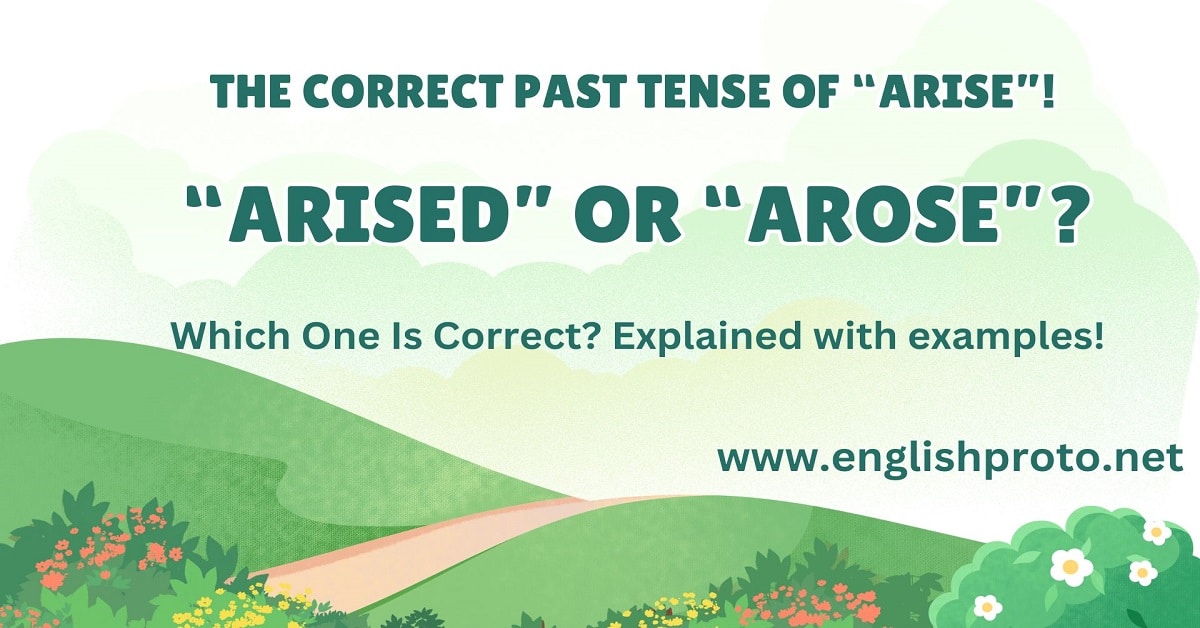The Correct Past Tense of “Arise”! “Arised” or “Arose”? Which One Is Correct? If you’ve ever paused mid-sentence, unsure whether to use arised or arose, you’re not alone. The confusion around this irregular verb trips up even the best writers.
But here’s the good news, you’re about to clear it up once and for all. With just a few minutes, you’ll learn the proper usage and confidently avoid common mistakes.
Why does this matter? Using the right word not only makes your writing polished but also helps you sound professional and credible. So, buckle up, because by the end of this article, you’ll master the mystery of arised vs. arose!
The Importance of Proper Grammar
Why does it matter whether you use “arised” or “arose”? Language is a tool for communication, and using words correctly ensures clarity and professionalism.
Misusing terms like “arised” can make your writing appear unpolished or ungrammatical, potentially causing misunderstandings. Whether you’re a student, professional, or casual writer, mastering irregular verbs enhances both your written and spoken English.
Quick Summary: The Correct Form
The correct past tense of “arise” is “arose.”
Breakdown of Forms:
| Verb Form | Correct Word | Example |
|---|---|---|
| Base Form | arise | “New opportunities arise unexpectedly.” |
| Past Tense | arose | “A conflict arose during the meeting.” |
| Past Participle | arisen | “The issue has arisen again.” |
Key Takeaways:
- Always use “arose” for the past tense.
- Use “arisen” in perfect tenses, usually with “has” or “had.”
- “Arised” is not a valid word and should be avoided entirely.
Reasons for Confusion
1. Irregular Verb Patterns
Most English verbs form their past tense by adding “-ed” to the base form (e.g., “walked,” “talked”). However, “arise” is an irregular verb, meaning it doesn’t follow this standard rule. Instead, it takes unique forms: “arise,” “arose,” and “arisen.” This irregularity can confuse even native speakers.
2. Similarity to Other Words
Words like “rise” and “raise” share similar meanings and structures, leading to mix-ups.
- “Rise” has the past tense “rose” and the participle “risen.”
- “Raise” is a regular verb with the forms “raised” for both past tense and past participle.
The similarity in pronunciation and context often leads people to mistakenly assume “arise” should follow the same pattern as “raise,” resulting in the incorrect form “arised.”
3. Overgeneralization
Learners and even experienced writers sometimes generalize the “-ed” rule for all verbs, assuming that adding “-ed” to the end of a verb will create its past tense. This habit contributes to the common misuse of “arised.”
4. Limited Everyday Use
The verb “arise” is more formal and less commonly used in casual conversations compared to simpler alternatives like “occur” or “happen.” Due to its limited exposure, people may be less familiar with its irregular forms.
Detailed Explanation of “Arise”
What Does “Arise” Mean?
The verb “arise” has several meanings depending on the context. It is often used in formal or literary settings to describe the following:
- To Emerge or Occur:
- “Problems arise when expectations aren’t communicated clearly.”
This usage highlights the emergence of issues or situations.
- “Problems arise when expectations aren’t communicated clearly.”
- To Get Up or Stand Up:
- “She arose from her chair to address the audience.”
This sense of the word describes physical movement, often used in literary contexts.
- “She arose from her chair to address the audience.”
- To Originate or Result From Something:
- “The conflict arose from a misunderstanding between the parties.”
This emphasizes the cause or origin of a situation.
- “The conflict arose from a misunderstanding between the parties.”
Proper Usage of Forms
Understanding when to use “arise,” “arose,” and “arisen” is crucial for correct grammar. Here’s a closer look:
Base Form (Arise):
Used for present tense or general statements.
- “Challenges arise when teams lack clear communication.”
Past Tense (Arose):
Used to describe actions that occurred in the past.
- “A unique opportunity arose last year.”
Past Participle (Arisen):
Typically used with auxiliary verbs like “has,” “have,” or “had” in perfect tenses.
- “Several concerns have arisen since the announcement.”
Common Errors to Avoid
Many people make mistakes when conjugating “arise.” Let’s explore some common errors and how to fix them:
- Using “arised” Instead of “arose”:
- Incorrect: “A new challenge arised yesterday.”
- Correct: “A new challenge arose yesterday.”
- Mixing Up “arise” with “raise”:
- Incorrect: “They raised from their chairs to leave.”
- Correct: “They arose from their chairs to leave.”
- Confusing “arise” with “rise”:
- Incorrect: “Issues have rose recently.”
- Correct: “Issues have arisen recently.”
Synonyms and Alternatives
If “arise” feels too formal or you’re looking for variety in your writing, consider using these synonyms:
| Synonym | Example |
|---|---|
| Emerge | “A solution emerged from the discussion.” |
| Occur | “Problems often occur unexpectedly.” |
| Originate | “The idea originated from their brainstorming session.” |
| Develop | “An opportunity developed during the event.” |
Using synonyms can add variety to your writing while maintaining clarity.
Examples in Sentences
Using “Arose”:
- A significant opportunity arose during the conference.
- Unexpected challenges arose as the project progressed.
- A disagreement arose over the allocation of resources.
Using “Arisen”:
- New issues have arisen since the last update.
- Concerns about safety have arisen in recent weeks.
- The question of funding has arisen again.
Contextual Examples:
- When the fire alarm sounded, everyone arose and evacuated the building.
- The problem arose because no one reviewed the final draft.
- Over the years, similar issues have arisen in other departments.
Origins and History
The word “arise“ originates from Old English “ārīsan,” a combination of the prefix “ā-“ (meaning “away” or “out of”) and “rīsan” (to rise). Its earliest meanings involved physical rising or standing up, but over time, it gained figurative uses to describe situations, issues, or events emerging.
The irregular nature of the verb has been preserved through centuries of use, which is why its past forms “arose” and “arisen” don’t follow modern grammatical rules.
Practical Tips for Mastery
Here are some tips to help you confidently use “arise” and its forms:
- Memorize Irregular Forms:
Practice conjugating “arise” alongside similar irregular verbs like “rise” and “fall.” - Read and Write Regularly:
Exposure to correct usage in books, articles, and professional writing will reinforce your understanding. - Use Mnemonics:
Associate the forms with memorable sentences, like “The sun arose early, and new challenges have arisen.” - Consult Reliable Sources:
When in doubt, refer to grammar guides or trusted dictionaries to confirm the correct usage.
Conclusion
In the debate of “arised” and “arose,” there’s a clear winner: “arose.” Understanding and using the correct forms of “arise”—“arose” for past tense and “arisen” for past participle ensures your writing is polished, professional, and grammatically correct.
Final Takeaways:
- “Arised” is not a valid word; avoid using it.
- The correct past tense of “arise” is “arose.”
- For perfect tenses, use “arisen.”
- Practicing with examples and synonyms will help you master this irregular verb.
Clear and accurate communication is key to effective writing. By mastering tricky verbs like “arise,” you’ll stand out as a confident and skilled communicator. Next time a situation arises where you need this verb, you’ll know exactly what to do!



